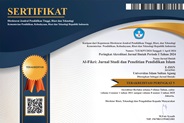POLA PENYIMPANGAN MUSLIM TERHADAP AJARAN AGAMANYA ( Perspektif Pendidikan Islam)
Abstract
Muslims in Indonesia and all over the world have the guidance regarding moral, which is clearly mentioned in the Quran and Sunnah (the prophet tradition). They have the written value, which is directly or indirectly used as a guidance. Nevertheless, the reality shows that those great values are not always done and realized in the real life of society. Religious and cultural teaching is only as a cognitive consumption (as knowledge), no realization, so that affective and psychomotor aspects are ignored.
Behaviour of society which is far from the believed values will deviate from religious teaching. The paper discusses the problems of why Muslims deviate from their religious teaching, and of what factors which affect the deviation.
The deviation done by Muslims are as follows; they do not understand their religious teaching, do not pray, do not fast in Ramadhan month, do not pay zakat, do not wear Islamic cloth. The factors affecting deviation of religious teaching are personality factor (laziness, no interest, no action), economy factor (poverty, work hard, money oriented), academic (knowledge) factor (no study, no understanding), and environmental factor (relation to family, neighbour, friends, and society).
Full Text:
PDFDOI: https://dx.doi.org/10.30659/jspi.v1i1.2429
Refbacks
- There are currently no refbacks.
Al-Fikri is published by the Department of Islamic Religious Education, Faculty of Islamic Studies, Universitas Islam Sultan Agung, Semarang, Indonesia.

This work is licensed under a Creative Commons Attribution 4.0 International License








